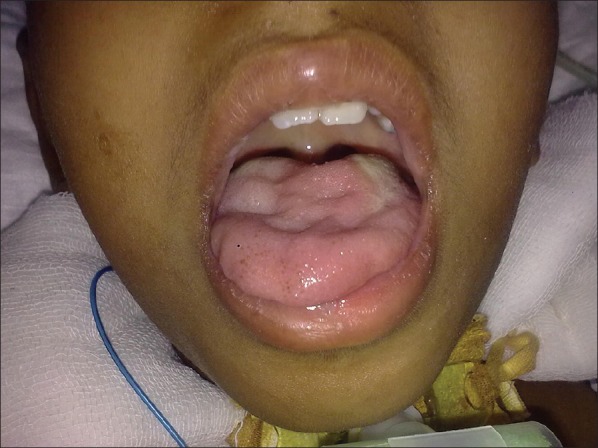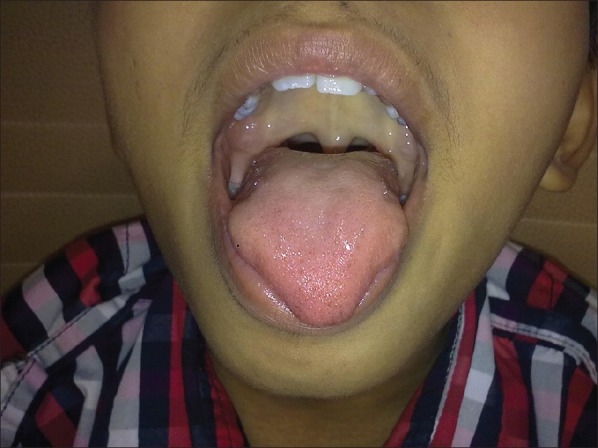Abstract
Guillian Barre Syndrome (GBS) is associated with cranial nerve involvement. Commonest cranial nerves involved were the facial and bulbar (IXth and Xth). Involvement of twelfth cranial nerve is rare in GBS. We present a case of GBS in a thirteen years old boy who developed severe tongue weakness and wasting at two weeks after the onset of GBS. The wasting and weakness of tongue improved at three months of follow up. Brief review of the literature about XIIth cranial nerve involvement in GBS is discussed.
Keywords: Guillain Barre syndrome, tongue weakness, twelfth cranial nerve
Introduction
Guillian Barre Syndrome (GBS) is associated in 45-75% of cases with cranial nerve involvement. Facial nerve is the commonest to be involved followed by extra ocular muscles and lower cranial nerve involvement.[1] Twelfth cranial nerve involvement is extremely rare in GBS. Only two cases has been reported till date with GBS with total paresis of motor cranial nerves.[2,3] Here we present a case of GBS with XIIth nerve involvement.
Case Report
A thirteen year old boy presented with acute progressive areflexic flaccid quadriparesis associated with motor cranial nerve involvement with bilateral facial and bulbar weakness. He had an upper respiratory infection one week preceding the motor weakness which started from the lower limbs. On day seven after the onset of motor weakness of limbs, the child developed significant bulbar weakness, difficulty in talking and could not move the tongue. He was totally anarthric. On day nine, he had significant respiratory muscle weakness requiring mechanical ventilatory support. On day fourteen, bilateral tongue atrophy without fasciculations was noticed [Figure 1]. The nerve conduction studies (NCS) were suggestive of severe demyelinating motor sensory polyradiculoneuropathy. The facial nerve conductions revealed facial neuropathy. His anti-ganglioside antibody panel in the blood showed positive IgM GM2, GT1b, IgG GM1,2,3 and GT1b antibodies. His CSF showed albuminocytological dissociation and his Antinuclear antibody was negative. His magnetic resonance image (MRI) brain was normal. He was treated with intravenous immunoglobulin at a daily dose of 0.4 g/kg for five days. The child required prolonged ventilatory care for 22 days. He showed gradual improvement and started swallowing after eight weeks of the onset of illness. The wasting of the tongue also improved gradually at 3 months after the onset of illness [Figure 2]. At 6 months follow up, he was walking with support with residual bilateral foot drop. Repeat NCS was suggestive of motor sensory demyelinating radiculoneuropathy with improvement in conduction velocities and compound muscle action potential amplitudes compared to baseline study.
Figure 1.

Tongue wasting noted at 2 weeks after the onset of motor weakness
Figure 2.

Improvement in tongue weakness and wasting noted at 6 months
Review of literature
Twelfth nerve involvement, either isolated or as a part of multiple cranial nerve involvement is quite uncommon and only two cases has been reported till date as a part of multiple motor cranial nerve involvement in a case of GBS. Tan et al., reported a case of fulminant GBS with quadriplegia and total paresis of motor cranial nerves and Polo et al., reported a case of atypical GBS with multiple cranial neuropathies including XIIth cranial nerve involvement.
Discussion
GBS with multiple cranial nerve involvement is a known entity but the involvement of XIIth cranial nerve is extremely rare. Our patient had multiple cranial neuropathies with involvement of VIIth, IXth, Xth and XIIth nerves. He had a severe form of GBS with areflexic quadriparesis along with respiratory muscle involvement requiring prolonged ventilatory support. His serial NCS showed sensory motor neuropathy of demyelinating type. His MRI brain was normal supporting that the tongue weakness is due to XIIth cranial nerve involvement.
Twelfth nerve involvement, either isolated or as a part of multiple cranial nerve involvement is quite uncommon and only two cases has been reported till date as a part of multiple motor cranial nerve involvement in a case of GBS. Tan et al., reported a fulminant case of GBS with quadriparesis with all motor cranial nerve involvement and their NCS showed segmental demyelination which was responsible for such severe involvement and possibly the pathophysiology in this case and our case are similar.[2] Polo et al. described a 23 years gentleman who developed a progressive illness over ten days with diplopia, facial diplegia and a nasal voice.[3] Subsequently, the patient also developed weakness of the neck and tongue muscles, dysphagia, abolition of reflexes of the left arm and right triceps but without involvement of the respiratory muscles or other limbs. CSF studies showed slightly raised protein with no cells. Neurophysiological studies showed a demyelinating disorder with secondary axonal damage. However, the same patient had involvement of reflexes of left arm and right triceps only without involvement of respiratory muscles and lower limbs. Hence it was thought to an atypical variant of GBS in contrast to our case where he had all the typical features of GBS. Our patient showed anti-GM2 antibody positive which is usually seen in post CMV infection with or without GBS.[4] Anti-GT1b is usually associated with severe form of GBS.[5] usually going on to ventilatory support requirement and the same is found in our patient. The two previous case reports did not have the autoantibody levels to corroborate the clinical and electrophysiological findings. The cranial neuropathy in our patient showed gradual recovery and tongue atrophy recovered over next three months. At 6 months follow up he had shown good clinical and electrophysiological recovery.
Conclusion
GBS with multiple cranial nerve involvement can rarely involve the XIIth nerve as well causing significant tongue weakness and such a presentation may be indicative of a severe nature of the disease and it usually recovers over a period of time.
Footnotes
Source of Support: Nil.
Conflict of Interest: None declared.
References
- 1.Bradley WG, Daroff RB, Fenichel GM, Jankovic J. Neurology in Clinical Practice. In: Yadollag Harati, Peter E., editors. BoschDisorders of Peripheral Nerves. 5th ed. Vol. 2. Philadelphia: Butterworth-Heineman, Elsevier Inc; 2008. pp. 2249–356. [Google Scholar]
- 2.Tan AK, Chee MW. Fulminant Guillain-Barré syndrome with quadriplegia and total paresis of motor cranial nerves as a result of segmental demyelination. J Neurol Sci. 1995;134:203–6. doi: 10.1016/0022-510x(95)00235-8. [DOI] [PubMed] [Google Scholar]
- 3.Polo JM, Alañá-García M, Cacabelos-Pérez P, Ortín-Castaño A, Ciudad-Bautista J, López-Alburquerque JT. Atypical Guillain-Barré syndrome: Multiple cranial neuropathy. Rev Neurol. 2002;34:835–7. [PubMed] [Google Scholar]
- 4.Yuki N, Tagawa Y. Acute cytomegalovirus infection and IgM anti-GM2 antibody. J Neurol Sci. 1998;154:14–7. doi: 10.1016/s0022-510x(97)00174-3. [DOI] [PubMed] [Google Scholar]
- 5.Kusunoki S, Kaida K. Antibodies against ganglioside complexes in Guillain-Barré syndrome and related disorders. J Neurochemistry. 2011;116:828–32. doi: 10.1111/j.1471-4159.2010.07029.x. [DOI] [PubMed] [Google Scholar]


